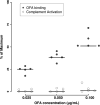Induced resistance to ofatumumab-mediated cell clearance mechanisms, including complement-dependent cytotoxicity, in chronic lymphocytic leukemia
- PMID: 24431228
- PMCID: PMC4391060
- DOI: 10.4049/jimmunol.1302954
Induced resistance to ofatumumab-mediated cell clearance mechanisms, including complement-dependent cytotoxicity, in chronic lymphocytic leukemia
Abstract
Ofatumumab (OFA), a human CD20-targeting mAb, kills B lymphocytes using the innate immune system including complement-dependent cytotoxicity (CDC). The efficacy of OFA in patients with chronic lymphocytic leukemia (CLL) is limited by drug resistance, which is not well characterized. To better understand mechanisms of resistance, we prospectively studied CLL cells isolated from blood samples collected before and after in vivo exposure to the initial dose of OFA therapy in 25 patients undergoing their first treatment for progressive CLL. As previously reported, OFA therapy rapidly decreased the absolute lymphocyte count, CD20 expression by CLL cells, and serum complement levels. We now show that after administration of the first dose of OFA, there was a modest rebound in the absolute lymphocyte count and serum complement levels, but substantial ongoing loss of CD20 expression by CLL cells. These post-OFA treatment CLL cells were highly resistant to OFA-mediated CDC but retained sensitivity to alemtuzumab-mediated CDC in vitro. Posttherapy serum OFA levels correlated inversely with both the amount of pretreatment circulating cell-bound CD20 and with the decrease in this value following treatment. In vitro OFA-mediated CDC did not predict clinical responses, and the patients with first-dose reactions to OFA did not have markers of increased complement activation in vivo. We propose that optimal efficacy of CD20- targeted therapy for CLL requires determining an mAb dose size and frequency that optimizes CLL killing without exceeding the capacity of the cytotoxic mechanisms and thus minimizes loss of CD20 expression in the surviving CLL cells.
Trial registration: ClinicalTrials.gov NCT01024010.
Conflict of interest statement
Drs. Zent, Taylor, and Shanafelt have research funding from GlaxoSmithKline. Dr. Taylor has received research funding from GenMab. Dr. Zent has received research funding from Genentech and Genzyme.
Figures





References
-
- Keating MJ, O’brien S, Albitar M, Lerner S, Plunkett W, Giles F, Andreeff M, Cortes J, Faderl S, Thomas D, Koller C, Wierda W, Detry MA, Lynn A, Kantarjian H. Early results of a chemoimmunotherapy regimen of fludarabine, cyclophosphamide, and rituximab as initial therapy for chronic lymphocytic leukemia. J Clin Oncol. 2005;23:4079–4088. - PubMed
-
- Kay NE, Geyer SM, Call TG, Shanafelt TD, Zent CS, Jelinek DF, Tschumper R, Bone ND, Dewald GW, Lin TS, Heerema NA, Smith L, Grever MR, Byrd JC. Combination chemoimmunotherapy with pentostatin, cyclophosphamide, and rituximab shows significant clinical activity with low accompanying toxicity in previously untreated B chronic lymphocytic leukemia. Blood. 2007;109:405–411. - PMC - PubMed
-
- Hallek M, Fischer K, Fingerle-Rowson G, Fink AM, Busch R, Mayer J, Hensel M, Hopfinger G, Hess G, von Grunhagen U, Bergmann M, Catalano J, Zinzani PL, Caligaris-Cappio F, Seymour JF, Berrebi A, Jager U, Cazin B, Trneny M, Westermann A, Wendtner CM, Eichhorst BF, Staib P, Buhler A, Winkler D, Zenz T, Bottcher S, Ritgen M, Mendila M, Kneba M, Dohner H, Stilgenbauer S. Addition of rituximab to fludarabine and cyclophosphamide in patients with chronic lymphocytic leukaemia: a randomised, open-label, phase 3 trial. Lancet. 2010;376:1164–1174. - PubMed
-
- Glennie MJ, French RR, Cragg MS, Taylor RP. Mechanisms of killing by anti-CD20 monoclonal antibodies. Molecular immunology. 2007;44:3823–3837. - PubMed
-
- Zent CS, Secreto CR, Laplant BR, Bone ND, Call TG, Shanafelt TD, Jelinek DF, Tschumper RC, Kay NE. Direct and complement dependent cytotoxicity in CLL cells from patients with high-risk early-intermediate stage chronic lymphocytic leukemia (CLL) treated with alemtuzumab and rituximab. Leukemia research. 2008;32:1849–1856. - PMC - PubMed
Publication types
MeSH terms
Substances
Associated data
Grants and funding
LinkOut - more resources
Full Text Sources
Other Literature Sources
Medical
Research Materials

